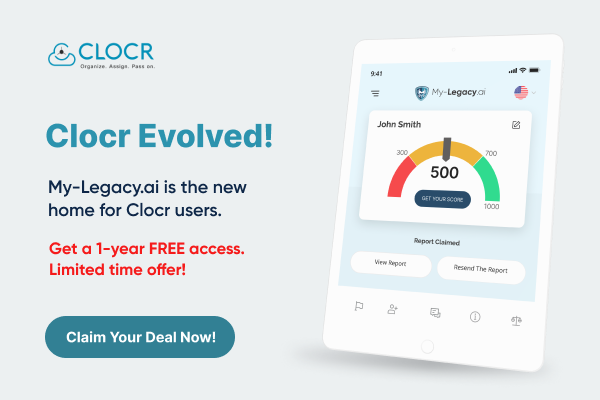Have you ever thought about if and when you would start Estate Planning?
Creating an Estate Plan is more important than you might think it is. Apart from letting you pass on your assets and take care of your loved ones after your death, a carefully thought-out Estate Plan can help you plan to take care of yourself while you’re alive too.
If you’re reading this and haven’t started an Estate Plan yet, now is the time to do so! No matter how difficult it might be to think about one’s own death, it can never be too early to plan for emergencies.
Commonly, Estate Plans are started (or updated) when:
- An emergency occurs in the family: A common trigger when people start Estate Planning is when a crisis strikes someone in the family. This could be something medical or financial. However, it is not best practice to wait for a crisis to strike before you start creating a plan.
- You apply for Insurance: Insurances can be helpful to your family only if you make clear plans about what to do with them. Apart from naming your Beneficiary designations, use your insurance to help your beneficiaries cover funeral costs, business debt and avoid income tax upon the transfer of any proceeds payable. You can do this easily by including it in your Estate Plan.
- You open a savings account: Adding beneficiary designations to your savings account needs to be the first step after opening one. This way, the assets in your account would be protected and transferred to a person of your choice if you were to pass away.
- You buy property: As soon as you purchase a vehicle, a house or any real estate, your next step of action needs to be planning for it. Add this property to your Will or a Trust to help your loved ones avoid lengthy and expensive court battles if you were to pass.
- You have an unmarried partner: Estate Planning is more important for unmarried couples than it is for married couples, especially because the former is not considered to be a legal relation. Mentioning the name of your unmarried partner and adding them to your Will is the only way to make sure they are protected if you were to pass away.
- You get married: While you might have combined assets after marriage, you should create individual plans keeping your spouses in mind. Moreover, you need to plan what happens to the kids and your assets if either of you or even both of you, were to pass away.
- You have kids: Having kids is one of the most important reasons to create an Estate Plan. Creating a Will ensures your kid(s) have guardians you choose and financial plans that you arrange if something happens to you and your partner.
- You get divorced: Most Estate Plans are made with their spouses. If you are divorced, it is crucial to revisit your documents and make revisions that might have changed since then. This is also why experts advise steering clear from joint Wills.
- There are births in the family: Another common time to update an Estate Plan is when there is a new addition to the family. You may want to divide your assets differently or make some new investments especially for the newborn. Your Estate Plan needs to reflect all of this.
- You inherit something: While inheritance may sometimes come unexpectedly, it is important to add this is to your Estate Plan as early as possible. This is more important if it is an asset that could cause any disputes in the family.
- You start thinking of retirement: Estate Planning forms a great part of a retirement plan. You can enjoy your retirement in peace only if you’re sure you have taken care of everything for the future. An Estate Plan helps you do this.
From above, it is clear that for most people, Estate Planning occurs as a consequence of an important life event. While this is a good practice to follow, it might not be most beneficial to your family members, especially because most of these milestones occur at a later point in life.
Getting Started Early
A good practice to follow while Estate Planning is to start planning while you’re still young. Ideally, as soon as you turn 18. This would:
- Give you more time to understand what Estate Planning is: Beginning early would give you plenty of time to understand exactly what Estate Planning is and why it is important to start one regardless of age, income, and family background.
- Allow you to refine your Estate Plan: More time spent on planning for your Estate equals a higher chance of getting the highest benefit from your Estate Plan. This way, you’d be able to leave no stone unturned in your Estate.
- Help you identify and value all your assets: When you start early, the chances of you overlooking an asset are considerably low. You would be able to recognize your Digital Assets or other items like a piece of artwork as your assets too.
- Empower you to deal with emergencies efficiently: Starting a plan early can break you out of the common misconception that Estate Planning is only for those of certain age. Consequently, you’d be more prepared for any emergencies, which occur irrespective of age.
- Equip your loved ones with legal direction on what to do: You’d probably want a specific someone to execute your wishes for your Estate in case of an emergency. However, they wouldn’t be able to do this without the legal documents that form your Estate Plan.
But don’t worry if you did not start Estate Planning at 18. You can still create an Estate Plan to protect your family. The best way to do this is by consulting with a professional to get a clear picture of your next steps.
Don’t forget to add your Digital Assets to your Estate Plan. Digital Assets are still new to the Estate Planning industry and require an attorney with Digital Estate Planning experience. However, you can also easily plan for them online.
Clocr lets you plan for your Digital Assets by creating a Digital Estate Plan right from home!

